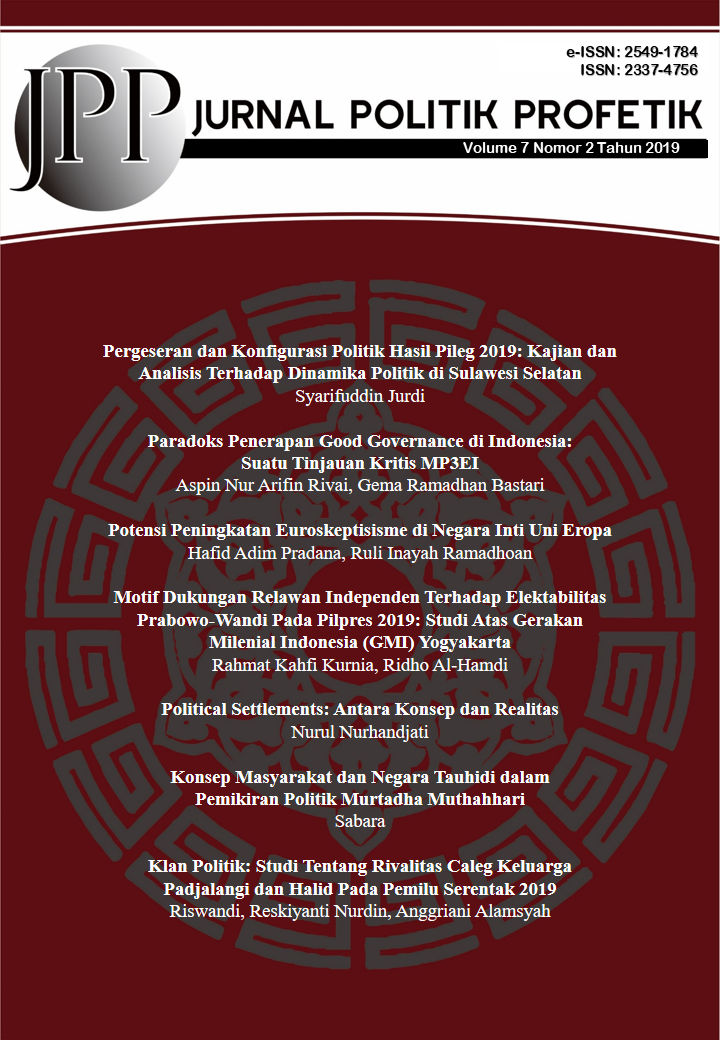KONSEP MASYARAKAT DAN NEGARA TAUHIDI DALAM PEMIKIRAN POLITIK MURTADHA MUTHAHHARI
Abstrak
This paper was an attempt to examine the thoughts of Murtadha Mutahhari, especially in his political ideas regarding society and the state. Examining the political thoughts of Murtadha Muthhari in this paper is developed into 3 problem formulations namely; what is the conception of Tauhid's worldview according to Murtadha Mutahhari? what is the concept of Tauhidi society according to Murtadha Mutahhari? and how is Murtadha Muthahhari thought about the state? Murtadha Mutahhari was a figure of contemporary Iranian ulama-philosopher who took part as an ideologist and architect of the 1979 Iranian Islamic revolution. Tauhid's worldview forms the basis of the whole thought and ideology of Murtadha Mutahhari revolutionary. Monotheistic worldview meant a single-pole universe, centered on the One and the universe essentially come from or belongs to Allah and will return to Him. Allah was the objective to which all existence moved together and He also determined the direction of the objective whole universe, including humans. Tauhidi society is the implementation of Tauhid's worldview in the sociological domain which means a social bond where the supreme ruler is God/Allah and his people are treated equally according to God's commands. The Tauhidi people regard egalitarianism and justice as principles. Mutahhari's political views were oriented towards a theo-democratic state system which emphasized that Allah is the supreme ruler. Humans with the principle of independence and the value of their endeavors have the right to take part in determining the direction of the state while remaining based on the principle of egalitarianism and justice and divine/ilahi laws.
##plugins.generic.usageStats.downloads##
Referensi
Algar, Hamid. "Hidup dan karya Murtadha Muthahhari" dalam Pendahuluan buku Murtadha Muthahhari. Filsafah al-Hikmah: Pengantar Pemikiran Shadra. Bandung : Mizan, 2002.
Alison,Sandy. Pesan Sang Imam. Bandung: al-Jawad, 2000.
Bagir, Haidar. Murtadha Muthahhari: Sang Mujahid Sang Mujtahid. Bandung:Yayasan Muthahhari, 1998.
Barsihannor. “Murtadha Muthahhari” dalam Jurnal Al-Hikmah, Vol. 12, No. 1 (2011), h. 1-10.
Chumaedi, Achmad. “Pemikiran Murtadha Muthahhari tentang Negara dan Masyarakat serta Pandangannya terhadap Revolusi Islam Iran” dalam Jurnal of Goverment and Civil Society, Vol. 2, No. 1 (2018) h. . 33-50.
Engineer, Asghar Ali. Devolusi Negara Islam. Yogyakarta: Pustaka Pelajar, 2000.
Harahap, Syahrin. Metodologi Studi Tokoh Pemikiran Islam. Jakarta: Istiqamah Mulya Press, 2006.
Kazhim, Musa. Belajar Menjadi Sufi. Jakarta:Lentera Basritama,2002.
Labib, Muhsin. Para Filosof Sebelum dan Sesudah Shadra. Jakarta:al-Huda Islamic Center, 2005.
Muthahhari, Murtadha. Karakter Agung Ali bin Abu Thalib. Jakarta: Yayasan Zahra, 2002.
Muthahhari, Murtadha. Kritik Islam Terhadap Materialisme. Jakarta: al-Huda Islamic Centre, 2001.
Muthahhari, Murtadha. Manusia dan Agama. Bandung: Mizan,2007.
Muthahhari, Murtadha. Manusia dan Alam Semesta. Jakarta: Lentera Basritama, 2002.
Muthahhari, Murtadha. Masyarakat dan Sejarah. Yogyakarta: Rausyan Fikr Institute, 2012.
Muthahhari, Murtadha. Mengenal Epistemologi. Jakarta: Lentera, 2001.
Muthahhari, Murtadha. Mengenal Ilmu Kalam. Jakarta: Pustaka Zahra, 2002.
Muthahhari, Murtadha. Pandangan Dunia Tauhid. Bandung: Yayasan Muthahhari, 1994.
Nihaya. “Sintesa Filsafat dan Teologi Murtadha Muthahhari” dalam Jurnal Suleana, Vol. 8, No.1 (2013), h. 111-118.
Qira’ati, Muchsin. Tauhid: Pandangan Dunia Alam Semesta. Jakarta: CV. Firdaus,1991.
Shihbudi, Riza. Biografi Politik Imam Khomeini. Jakarta: Gramedia Pustaka Utaama, 1996.
Supriyadi, Eko. Sosialisme Islam: Pemikiran Ali Syari’ati. Yogyakarta: Pustaka Pelajar, 2003.
Syari’ati, Ali. Agama Versus “Agama”. Jakarta: Pustaka Hidayah, 2000.
Yamani. Filsafat Politik Islam: Antara al-Farabi dan Khomeini. Bandung: Mizan,2002.















